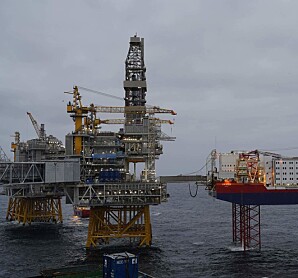
The oil lobby has made Norwegians take climate change less seriously
Radical changes are needed before Norwegians take climate change seriously, says one researcher. First, the ties between the oil lobby and the politicians must be loosened.
Norway has a high proportion of climate sceptics, compared to other countries. Every fourth Norwegian does not believe that human activity affects the climate. Only one in ten Italians say the same, according to a study from 2022.
And the people who actually believe that the climate is changing are often optimists.
Surveys show that Norwegians have a markedly greater belief that new technology will solve climate change than people in other European countries. Researchers at Norce, an independent research institute, have written about Norwegians’ strong sense of technology optimism (in Norwegian).
The lobby influences us
At the same time as climate scientists report that the globe is burning up, many Norwegians argue that it is important that their country continues to produce more oil.
What could be the explanation for this? Ketil Raknes, a researcher at Kristiania University College, believes there are some special reasons for this belief.
“We probably cannot escape the fact that interest groups around the oil industry have managed to create a completely different type of discussion in this country about climate problems,” Raknes says.
He studies lobbying and has contributed to a new report about who are the power brokers in Norwegian climate policy.
The oil and gas industry understood early on that the debate around environmental issues could become a challenge, he says. They had to find arguments that could adapt Norwegian environmental policy to allow continued oil extraction, according to Raknes.
These arguments have caught on, both with the politicians and the voters, according to the researcher.

Not undemocratic
Raknes would not call this lobbying undemocratic.
“Voters vote for parties that want to maintain the oil business. The parties that want to change this are small and not very influential in Norway,” he said.
On the other hand, this rhetoric has also shaped public opinion, he says.
“The fact that so many Norwegians are sceptical about climate change has a lot to do with what we have been told for the past 30 years,” he said.
Raknes points out that Norwegian oil rhetoric is full of what are called ‘oxymorons’.
Oxymorons are a combination of concepts that are essentially contradictory, such as ‘environmentally friendly oil production’. Or the argument in this sentence: ‘We must continue to extract oil because the Norwegian oil industry is the key to the green transition.’
Non-traditional methods
Raknes has previously been a political advisor for SV, the Socialist Left party. He was also state secretary in the Ministry of the Environment during the Stoltenberg II government, from 2012-2013.
When he later became a researcher, he became interested in studying the power of the oil lobby.
This was the power he most often saw being exercised when he was in politics. At the same time, he feels that the public largely underestimates it.
But studying lobbying is not easy. To find out how lobbyists work, he had to use non-traditional methods.
Lots of trips to the pub
Professional lobbyists don't go around bragging about how much influence they have.
“It's all a role-playing game. It is important for lobbyists that politicians appear as if they are the ones who actually decide. Consequently, the lobbyist exercises power in a very discreet way,” he says.
This makes this type of power difficult to study.
A researcher can use traditional social science methods such as questionnaires and interviews to study power. Raknes did. He asked politicians how often they have contact with lobbyists, how much influence they think they have, whether they think lobbying is good or bad for Norwegian democracy.
He also interviewed the lobbyists themselves.
But it was in the pub, after attending seminars with lobbyists, that he was able to ask questions about how things really work, he says.
Looks smarter
In the pub, lobbyists can admit that they see themselves as much smarter than the politicians they are trying to influence, he says.
And lobbyists are more professional than politicians, Raknes said.
“They employ economists, lawyers and other professionals who are as skilled as the bureaucrats in a ministry. They have their own experts who can compete with the state's own investigative expertise,” he said.
In addition, they employ former ministers, state secretaries and people with parliamentary experience and a party political background.
“These are people who understand the political system extremely well. They know when to contact politicians and when they are most likely to be influenced. Thus, in a way, they get disproportionately good access,” he said.
This makes it very difficult to challenge this power, he believes.
The Conservative Party becomes a green party
The ties between the major political parties, especially the Conservative Party and the Labour Party, and interest organizations have become strong over the years of oil operations in Norway, Raknes says.
This has shaped Norwegian politics in a way that makes it very challenging for individuals who want to debate the dominant beliefs, he says.
“If Norway is to become a greener society, we need more dramatic changes. The straps must be loosened,” he said.
Today, the Labour Party is closely linked to the oil industry through the trade union movement, Raknes said. However, he believes the Conservative Party has become more independent from Norwegian business organisations.
“I believe that the Conservative Party will become a green party long before the Labour Party,” he said.
Will LO want to phase out oil?
Raknes believes that it’s possible to imagine that even the interest groups themselves are beginning to move more politically.
He predicts that LO, The Norwegian Confederation of Trade Unions, will see that Norway has to phase out oil, for example.

“But that won't happen right away. First, the new industries must be profitable and have many jobs. We are far from that today. It’s a fact that value creation in the oil sector is very large. What will replace it is still very unclear. And probably much less profitable,” he said.
Not unique to Norway
The fact that lobbyist rhetoric influences people is not unique to Norway, Raknes said.
He said it’s the same in other countries that have strong carbon-intensive industries, such as Australia and to some extent, Canada.
“In these countries, the transition to a greener society is much more complicated than in countries that do not depend on these industries. It challenges established power structures in a fundamental way,” he said.
For countries like Sweden and Denmark, the best way for business to survive is to shift to a greener way of working. But that’s more challenging for Norway, especially now, Raknes said.
“In 2019, it looked like there would be a major green wave in Norwegian politics that could affect the major interest organizations and the major political parties,” he said.
But the pandemic, combined with a war in Europe, has meant that everything has changed dramatically.
“Now the Norwegian oil and gas industry has a very real new argument, namely that they have become an actor in the political security situation in Europe. It is clear that this changes the framework for the discussion,” he said.
Must bring people with us
Marianne Sivertsen Næss from the Labour Party is head of the Norwegian Parliament’s— the Storting — energy and environment committee. She replies in a comment to sciencenorway.no that she believes the Labour Party actually has the best climate policy.
“It can be summed up as ‘cut emissions, create jobs’. The energy transition must be fair and implemented in a way that involves people. That is why it is also incredibly important that it is done both in a realistic and fair way,” she says.
“We have both money and eventually a lot of technology that can cut emissions. The big job is to bring people with us. We have to make the energy transition in a safe way, where it does not have unreasonably large negative consequences for people,” she said.
Must ensure there are alternatives
As head of the Storting's energy and environment committee, Sivertsen Næss has no faith that shutting down Norwegian petroleum production is an effective climate measure.
“As long as the planes fly and the cars drive, they will buy the fuel from someone, whether it's Norway or Saudi Arabia. We should rather concentrate on getting rid of the use of fossil energy and ensuring there are alternatives,” she said.
Sivertsen Næss said Norway will achieve major emission cuts through the electrification of the Norwegian continental shelf, offshore wind, CO2 capture and storage, and replacing fossil energy with renewable energy.
“We are well underway there,” she said.
Translated by Nancy Bazilchuk
Reference:
Lars Gulbrandsen and Øyvind Nystad Handberg (Eds.): Hvem har makt i norsk klimapolitikk? 15 bidrag og en analyse på tvers (Who has power in Norwegian climate policy? 15 contributions and a cross-sectional analysis), FNI report 2, 2023 (in Norwegian)
———
Read the Norwegian version of this article at forskning.no






































